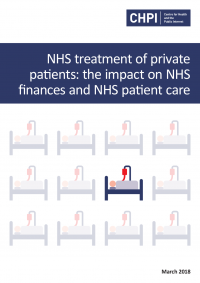 When the Health and Social Care Act was passed in 2012, the treatment of private patients was expected to become a significant source of NHS hospital trust income. NHS treatment of private patients: the impact on NHS finances and NHS patient care finds that while there has not been significant growth in private patient activity or income within the NHS in the intervening period, the continuing squeeze on NHS funding could lead to such practice becoming more commonplace, with a potential to impact on the availability of care for NHS patients.
When the Health and Social Care Act was passed in 2012, the treatment of private patients was expected to become a significant source of NHS hospital trust income. NHS treatment of private patients: the impact on NHS finances and NHS patient care finds that while there has not been significant growth in private patient activity or income within the NHS in the intervening period, the continuing squeeze on NHS funding could lead to such practice becoming more commonplace, with a potential to impact on the availability of care for NHS patients.
The report – based on official sources, Freedom of Information requests to all 153 acute hospital trusts, and interviews with hospital staff – reveals that:
- There has only been a small increase in the total income generated by the NHS from treating private patients since 2012 – from £511m in 2012/13 to £596m in 2015/16. However, a lack of clear accounting of costs makes it impossible to tell how much, if any net revenue has been derived from this activity.
- Nine hospital trusts made a loss on the treatment of private patients in some or all of the years from 2010/11 to 2015/16. Overall four of these nine hospitals made significant losses between 2010 and 2016, with one making a loss of £18 million over the six-year period.
- NHS hospitals treating private patients have also failed to receive payment for some of the services that they have provided. The total value of bad debts written off for all private patients treated at NHS Foundation Trust hospitals was £1.77m in 2014/15 and £1.81m in 2015/16.
- The NHS has set aside 1,142 beds for private patients, while a further 150 NHS beds are estimated to be occupied by private patients at any one time.
- NHS hospitals trusts differ widely in the way they set the prices that they charge private patients. Some hospitals have no agreed procedure for setting prices, while others negotiate prices with private insurance companies. This leads to wide variations in the prices charged private patients and big differences between these prices and the national tariff paid by NHS commissioners for NHS patients.
- Ten private patient units – mainly based in London NHS hospitals – account for nearly 60% of the £596m generated by the NHS from the treatment of private patients. For four of these hospitals, private patient income makes up more than 10% of their income.
NHS treatment of private patients: the impact on NHS finances and NHS patient care
Support Our Work
CHPI is the only truly independent health think-tank dedicated to the founding principles of the NHS. To continue our work keeping the public interest at the centre of health and social care policy, we need your help.
Please support CHPI so we can continue to impact the health policy debate.
